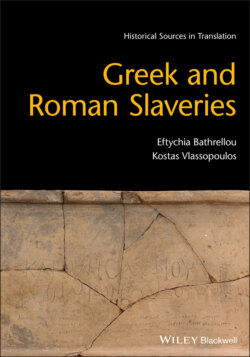Читать книгу Greek and Roman Slaveries - Eftychia Bathrellou - Страница 17
1.6 Strabo, Geography, 8.5.4: Greek Geography (End of First Century BCE/Early First Century CE)
ОглавлениеAncient authors tried to account for the origins of the helots. Here Strabo reports the views of Ephorus, a fourth-century BCE historian: according to his account, originally the Spartans were equal with the other communities of Laconia.
Literature: Vidal-Naquet 1986.
Ephorus says that (king) Agis, son of Eurysthenes, withdrew the equality and commanded everyone to pay tribute to the Spartans. All the others obeyed, but the Heleians, who had the city of Helos – and were called Helots – revolted. They were defeated totally in war and were condemned to be slaves on specified terms: namely, that their owner was not allowed to manumit them or to sell them outside the border. And this war was called the war against the Helots. We may almost say that it was those around Agis who established the helot system that persisted until the time of the Roman rule. For the Lacedaemonians held these men in a way as public slaves, having assigned to them some houses to live in and special services to perform.
How are the origins of the helots explained?
What conditions modified the slavery of the helots? What do you think were the reasons for such conditions?
How does Strabo try to conceptualize the peculiar slavery of the helots? With what does he compare them?
